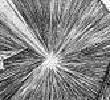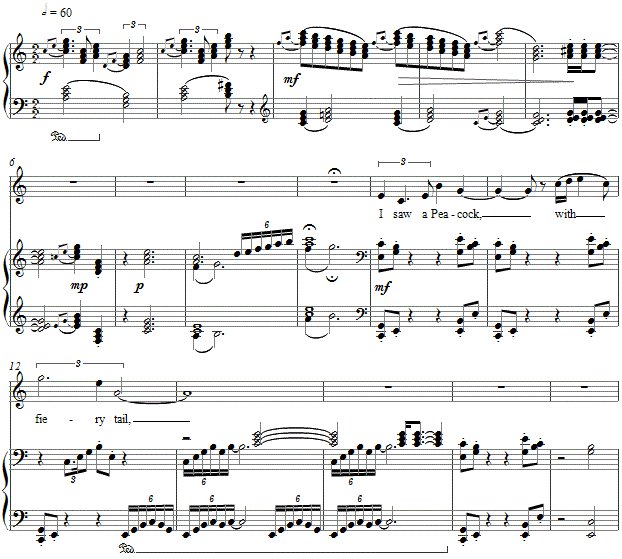Music and Texts of GARY BACHLUND
Vocal Music | Piano | Organ | Chamber Music | Orchestral | Articles and Commentary | Poems and Stories | Miscellany | FAQs
I Saw a Peacock - (2011)
for high voice and piano
I Saw a Peacock, with a fiery tail,
I saw a Blazing Comet, drop down hail,
I saw a Cloud, with Ivy circled round,
I saw a sturdy Oak, creep on the ground,
I saw a Pismire, swallow up a Whale, [ 1 ]
I saw a raging Sea, brim full of Ale,
I saw a Venice Glass, Sixteen foot deep,
I saw a Well, full of men's tears that weep,
I saw their Eyes, all in a flame of fire,
I saw a House, as big as the Moon and higher,
I saw the Sun, even in the midst of night,
I saw the man, that saw this wondrous sight.[ 4 pages, circa 3' 15" ]
The Oxford Dictionary of Nursery Rhymes notes it to be dated circa 1665, and published in the Westminster-Drollery, Or a Choice Collection of the Newest Songs & Poems Both at Court & Theaters, 1671. As a so-called "trick poem" which can be interpreted in various ways, the lines can be read as a sort of nonsense poetry, or read from the middle of one line to the middle of the next. For the purposes of a song setting and given my enthusiasm for nonsense poetry by such as Carroll, Lear, Morgenstern and more, I opt for the former in setting the various lines.
The key signature belies the fact that the setting wanders into varying polytonalities, beginning with diatonic triad upon triad, and thence to whole series and other tricks. The various sentences are set in a variety of ways, and with varying textures from the very calm to a fuoco of sixteenth notes and back again to the very calm mood in which it ends. Set for high voice, the tessitura ranges upwards as does the interpretation of different imagery in the poem.
The score for I Saw a Peacock is available as a free PDF download, though any major commercial performance or recording of the work is prohibited without prior arrangement with the composer. Click on the graphic below for this piano-vocal score.
NOTES
[ 1 ] Pismire is ostensibly an archaic, 14th century term of Scandinavian origin for a "piss ant." John Bunyan (1628-1688), noted for his Pilgrim's Progress, wrote a poem contemporary with the text above and entitled, Upon The Pismire, which concludes, "The piss-ant tell thee will what thou must do, / And set the way to life before thine eyes," and Walt Whitman (1819–1892) in his Leaves of Grass (1900) writes, "I believe a leaf of grass is no less than the journey-work of the stars, / And the pismire is equally perfect, and a grain of sand, and the egg of the wren,...." The word which joins the two together, pissant, has come to mean something vulgar or someone insignificant, as of the mid-20th century.

